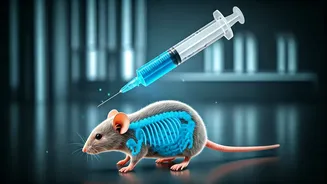Vaccine Breakthrough Unveiled
Cancer treatment is on the cusp of a revolutionary change, thanks to the development of an experiential 'super vaccine'. Initial findings from studies
on mice with cancer are incredibly encouraging, marking a potential shift in how we approach this disease. The vaccine's novel design and methodology aim to harness the body's natural defenses to combat cancer more effectively. The super vaccine's design is based on the idea of exposing the immune system to cancer cells, thereby training it to identify and attack cancerous growths. This method is distinct from traditional treatments and could provide more targeted and effective results. This groundbreaking vaccine is drawing attention from researchers and medical experts, who are optimistic about its potential to improve patient outcomes and lead to further studies in human trials.
How Super Vaccine Works
The innovative 'super vaccine' employs a unique method to combat cancer. Its primary function is to trigger and strengthen the body's immune response to cancerous cells. Unlike standard treatments, this vaccine uses an experiential approach, offering a potentially more targeted and effective therapy. It aims to teach the immune system to recognize and attack cancer cells, leading to their elimination. The vaccine's mechanism is designed to adapt to the specific type of cancer, thereby personalizing treatment. By utilizing the body's natural defenses, the vaccine works to minimize the damage to healthy cells, leading to fewer side effects compared to traditional treatments. Scientists hope the vaccine's method will improve patient survival rates and overall quality of life. This strategy is also expected to promote the long-term effectiveness of the treatment, minimizing the possibility of cancer recurrence.
Animal Studies Promise
The 'super vaccine' has shown remarkable potential in animal studies. The experiments on cancerous mice revealed outstanding outcomes, giving a clear indication of the vaccine's efficiency. These results provide significant encouragement for the next stages of development. The researchers observed a considerable reduction in tumor size, and in some instances, complete elimination of cancer. The vaccine also showed the ability to prevent cancer from spreading to other parts of the body, which is critical in managing the disease. The mice displayed a strong immune response, indicating that the vaccine has successfully activated the body's defenses. The successful animal studies lay the groundwork for potential human trials, taking the vaccine closer to clinical application. Further research is necessary to fully grasp the long-term effects and safety of this new cancer treatment.



















